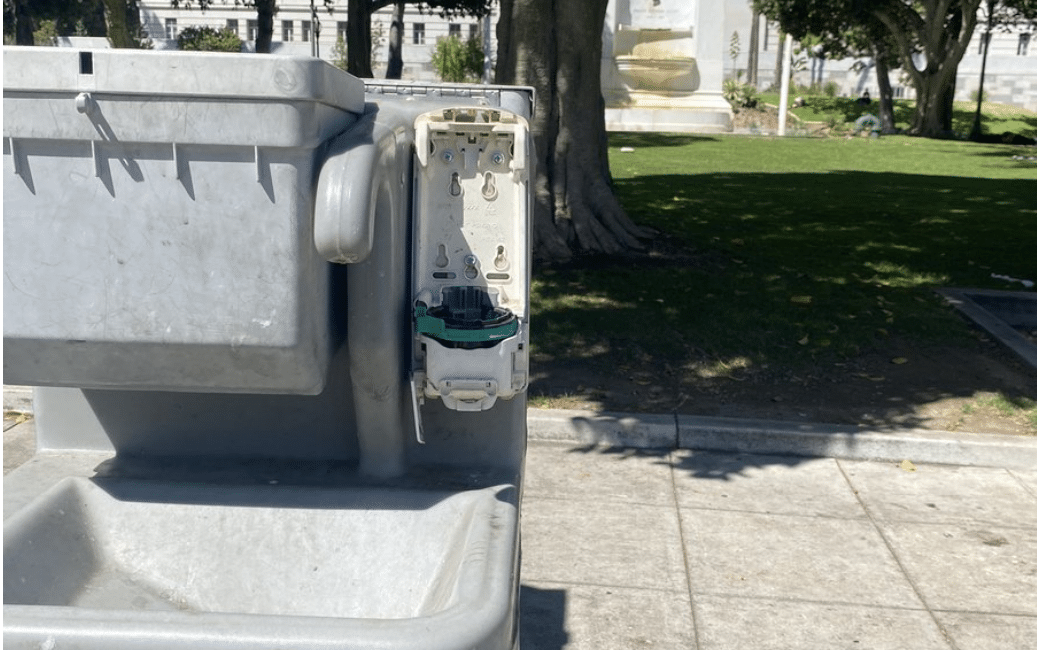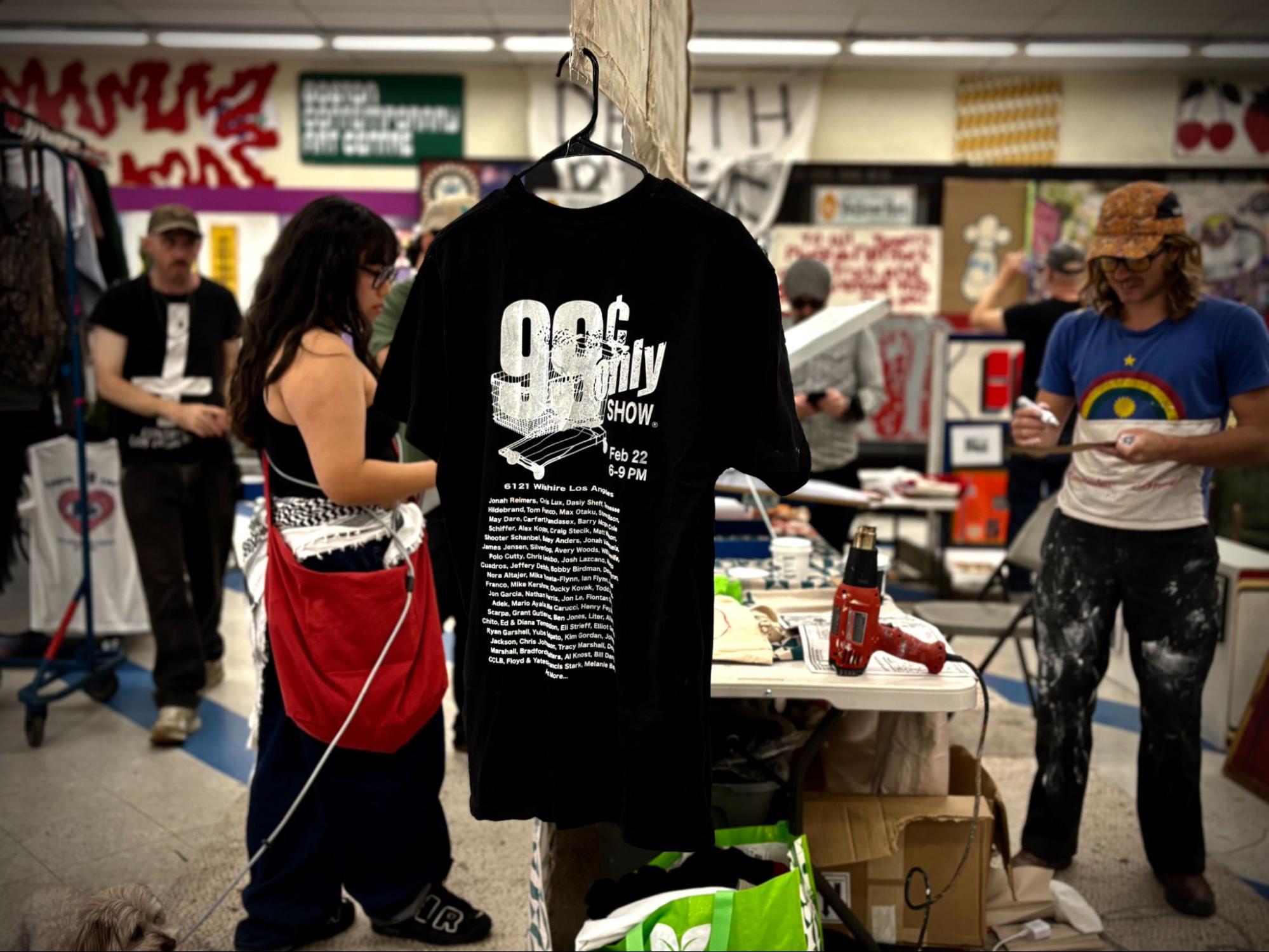Lexis-Olivier Ray
At yesterday’s press conference, Mayor Garcetti claimed that the maintenance of hand-washing stations “was a problem early on.” He said that today hand-washing stations are being maintained on a “daily basis.”
I’ve been monitoring hand-washing stations since mid-March when the city first rolled out hundreds of hand-washing stations for the tens of thousands of unhoused folks living on the streets. The CDC lists hand-washing as a primary method for controlling the spread of COVID-19.
While there are some hand-washing stations that are well stocked and refilled regularly, there are many that remain dry for weeks or months, to this day.
What good are hand-washing stations without water or soap? I asked that question back in April in a story that I wrote for Curbed LA about hand-washing stations not being maintained in MacArthur park (I reached out the Mayor’s office multiple times for comment and they never got back to me.) Days later, Mayor Garcetti announced that hand-washing stations would be monitored daily. At yesterday’s press conference the Mayor urged people to let them know if they came across hand-washing stations that aren’t being serviced.
Approximately an hour after Mayor Garcetti’s press conference yesterday I checked on a hand-washing station on Coronado Boulevard and London Street, near the 101 overpass. It had no soap or water and it was missing a soap dispenser. Last month, a resident of the encampment told me that the soap dispenser had been missing for two months. This morning I checked on the hand-washing station again and discovered the same situation as yesterday afternoon. A different resident of the nearby encampment told me it’s “been a while” since the hand-washing station was serviced. They mentioned that someone was there this morning to service a portable toilet, which was stocked with water and soap but they didn’t service the hand-washing station.
On Tuesday, I monitored two hand-washing stations on Alvarado Boulevard in MacArthur Park. One hand-washing station was completely dry, missing a soap dispenser and littered with trash. The other had soap in one dispenser and water but the other soap dispenser was empty. I wrote about both of these hand-washing stations back in April and have monitored them off and on since then. I’ve found that more often than not they’re missing soap and or water. This morning I checked up on the hand-washing stations on Alvarado Boulevard again and they were in the same state that they were on Tuesday.
This morning, I also came across another hand-washing station from National Construction Rentals on the northeast side of MacArthur Park Lake that was missing a soap dispenser (it had water and soap in the other dispenser.)
In addition to my findings, dozens of organizers and community members have been found similar results:
this is from today @MayorOfLA !!!! Selma & Cherokee, heart of your pet project ABH Schrader SECZ with extra special service levels @ShotOn35mm https://t.co/dEaAsbUYNy pic.twitter.com/z6Ss3PAEqE
— concerns about jam & mold specifically (@thatcarr) August 6, 2020
The one outside city hall hasn’t had soap for weeks pic.twitter.com/biOpLUKRiG
— Fascist Former W Staffer 4 Biden (@Fartgargler) August 6, 2020
Follow up it’s completely non functioning pic.twitter.com/ti619Xvewe
— momobro (@morgasm926) August 6, 2020
Further, L.A. Sanitation hygiene station service records from early April to late May 2020—obtained by citizen journalist Adrian Riskin and shared exclusively with L.A. Taco—show that dozens of hand-washing stations remained dry for days, months after the Mayor rolled out the hand-washing stations and said that they would be assessed daily. Hand-washing stations might be accessed daily but that doesn’t mean they’re being refilled with soap and water every day.
You can look through some of the records yourself from May 20 and May 21, 2020.
UNITED_HandWashStations_May... by Lexis-Olivier Ray on Scribd
UNITED_HandWashStations_May... by Lexis-Olivier Ray on Scribd
Mariah Castañeda
First big announcement: LADWP can cut service from “houses, businesses and other venues [that] are hosting unpermitted large gatherings.”
The mayor announced that LADWP is allowed to turn off the water and power from houses and businesses that host parties repeatedly. Garcetti said large house parties in Los Angeles have “become nightclubs in the hills” and spoke about the concern of “super spreader events” where a large group of people can be infected at once. He used this logic as reasoning to allow LADWP to shut off water and power from places repeatedly hosting parties.
It’s true that super spreader events account for possibly 20 percent of people being responsible for causing 80 percent of the COVID-19 spread. Super spreader events include parties, religious events, and bar nights. It’s interesting that Mayor Garcetti didn’t touch on the role that hastily opened bars might have played in the spread of the coronavirus earlier this summer, however. It’s worth remembering that COVID-19 cases spiked after bars opened, which is why they were closed again by Governor Newsom on June 28th. In the weeks prior to Newsom’s shut down, LA county health inspectors visited over 3,700 bars and dine-in restaurants and found that 83 percent of them were not in compliance with county protocols.
Profit margins are tight in the restaurant industry, and there’s a high demand for quick service which means that the time spent cleaning and spacing out customers could cut into profits potentially discouraging some establishments from following safety guidelines to keep employees and guests safe.
The mayor’s announcement that he’d cut off the water and power of repeat house party offenders leaves me with some questions. He doesn’t specify how big a party needs to be in order to be considered a violation. Mayor Garcetti insinuates that this is to enforce social distancing rules in affluent areas by calling the house parties “nightclubs in the hills,” but there are already discrepancies in how social distancing rules appear to be enforced across LA with LAPD breaking up a house party of 50 people in South L.A. and not breaking up a large party in a Beverly Hills home that later turned deadly.
The mayor also did not talk about the party at Sassafras Saloon that LAPD officers attended. Maskless deputies were spotted, drinking, littering, and were also filmed doing doing these activities until he was asked a question about the incident by reporter Claudia Peschiutta of KNX1070. The mayor said an investigation into the incident was underway.
I asked Mayor Garcetti two additional questions:
1) Will LAPD officers be required to follow the same mask standards of the public and will that be enforced? (The mayor notably did not answer our question about cops wearing masks.)
2) Rent was due four days ago. What are you doing or are considering doing to support families that may be facing financial ruin or losing their homes due to COVID-19?
Lexis-Olivier Ray: In March, the city council had a chance to offer renters more protections and create a broader moratorium on evictions but efforts to secure renters a longer repayment period and to put a halt on ALL evictions city-wide, narrowly failed to pass.
This month the Judicial Council, which oversees all the courts in California, could lift the suspension on evictions as early as next week which has led to a recent spike in demonstrations outside of the Getty House, the official residence of Mayor Garcetti.
Mariah Castaneda: What immediately sticks out to me in this response to a question about renters in LA is that Garcetti points to inaction from Congress and the Senate, and specifically points to how Congress allowed unemployment benefits to stall.
“That’s unacceptable, and they better not go on vacation before we pass that [another stimulus bill? Unemployment benefits?] that’s where the solutions lie,” Mayor Garcetti said of Congressional inaction.
What’s interesting to me is that the LA City Council had a recess last month from July 7th to July 28th, during an unprecedented pandemic.
After this, Garcetti began talking about supporting UBI (universal basic income) and how helpful a UBI would be for struggling Angelenos. He then said that the local government had “pennies on the dollar” compared to the “trillions our federal government has,” and said a legislative fix from the state government would be needed to impose a moratorium on all eviction proceedings.
It seemed to be a statement that evoked little bits of the Warren Presidential campaign and Andrew Yang Presidential campaign talking points at the same time providing a sharp reminder that recently Mayor Garcetti considered a Presidential run.
Garcetti also talked about a “free legal aid program that will defend tenants from illegal evictions” which sounds similar to the HELP Act which is a bill introduced by Reps. Ayanna Pressley and Rosa DeLauro and Sen. Kamala Harris that allocates $10 Billion to go to funding legal assistance to renters facing eviction.






